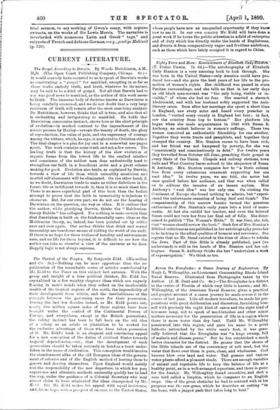The Control of the Tropics. By Benjamin Kidd. (Macmillan and
Co. 3s.)—Nothing can be more opportune than the re- publication of the remarkable series of articles contributed by Mr. Kidd to the Times on this subject last autumn. With the grasp and insight of a true political thinker, Mr. Kidd has crystallised in a few weighty chapters ideas which are vaguely S xiting in men's minds when they reflect on the incalculable wealth of the tropical regions of the earth, the impossibility of their development from within, and the inevitableness of the struggle between the governing races for their possession. boring the last ten decades indeed, as Mr. Kidd points out, nearly five million square miles of these regions have been brought under the control of the Continental Powers of Europe, and everywhere, except in the British possessions, the ruling instinct has been to fall back on the old idea of a colony as an estate or plantation to be worked for the exclusive advantage of those who have taken possession of it. Mr. Kidd's book is an eloquent and convincing appeal for a new conception of the duties of civilised States towards tropical dependencies,—viz., that the development of - such possessions should be taken seriously in hand as a trust under- taken in the name of civilisation. This conception would involve the abandonment alike of the old European ideas of the govern- ment of colonies and of the English method of leaving them to govern and develop themselves. Upon England would mainly rest the responsibility of the new departure, in which her past experience and altruistic methods eminently qualify her to lead the way, under the guidance of a Colonial Secretary who may almost claim to have originated the ideas championed by Mr. Kidd. But Mr. Kidd m tires his appeal with equal insistence, and, let us hope, with a prospect of success, to the United States,
whose people have now an unequalled opportunity if they know how to use it. In our own country Mr. Kidd will have done a great work if he turns the publie-attention to afield of enterprise and of duty which lies directly under the hands of Englishmen, and diverts it from comparatively vague and fruitless ambitions, such as those which have lately occupied it in regard to China.






































 Previous page
Previous page